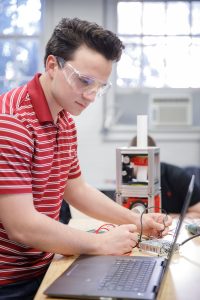
TUSCALOOSA, Ala. – Students at The University of Alabama building a small satellite as part of a NASA program are continuing their outreach efforts to state schools during the COVID-19 pandemic through online lessons.
The students in the group, called UASpace, created lessons using Alabama math and science standards that teach about space, satellites and space exploration. The lessons are available on an open Google Drive, and are an extension of their efforts this school year to bring space-centered lessons into classrooms in rural areas of the state.
“To our team, outreach is a core competency and is our reason for doing what we do,” said Piper Daniels, UASpace member. Daniels is from Grapevine, Texas, working on a Master of Business Administration after recently earning an aerospace engineering degree at UA.
“Space exploration is about what we are doing for the next generation and we want to teach them the importance of it,” she said. “We knew that changing our medium of outreach would be a process but we felt that reaching students was still critical to our mission as an organization and that it needed to be done.”
It’s just one way the students are adjusting while the University is on limited business operations with remote instruction. They are continuing the process of readying a small satellite to be launched into space as part of a NASA program.
The UA project is one of 18 small research satellites — called CubeSats — from 11 states selected by NASA to fly as auxiliary payloads aboard rockets launching in 2021, 2022 and 2023. Educational institutions, nonprofit organizations and NASA centers proposed the selected missions in response to NASA’s CubeSat Launch Initiative.
“It’s really stiff competition, and we are really excited to get The University of Alabama’s name on that list,” said Daniels.
UASpace, made up of nearly 50 students, calls their first mission BAMA-1. They aim to demonstrate an emerging technology to bring satellites out of orbit quicker. A launch date is not set, but the team requested a launch in the third quarter of 2021. The UA satellite will be taken to the International Space Station before deploying into orbit.
They are continuing their project through online communication and video conferencing amongst themselves and NASA while conducting initial testing over software programs.
“They all worked really hard and are dedicated to the mission,” said Dr. John Baker, professor of aerospace engineering and mechanics and a team adviser. “It’s a testament to their hard work. They are amazing students, and we should all be very proud of them.”
Along with Baker, faculty advisers include Michael Pope, instructor of marketing in the STEM Path to the MBA Program, and Dr. Rohan Sood, assistant professor of aerospace engineering and mechanics.
UASpace has received support from UA, Lockheed Martin, Linc Research Inc. and the Alabama Space Grant Consortium.
Contact
Adam Jones, UA communications, 205-348-4328, adam.jones@ua.edu
